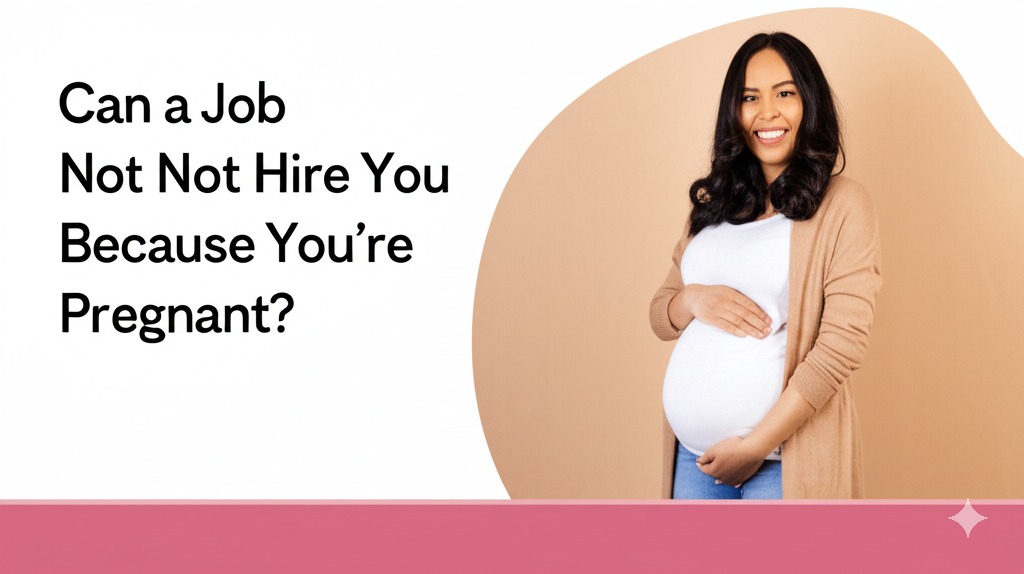
Imagine landing a dream job interview, nailing every question, and then being passed over—just because you’re pregnant. Sounds unfair, right? That’s because it is. Pregnancy discrimination in hiring is not only unethical—it’s also illegal in many places, including the United States.
In this article, we’ll explore whether a job can legally deny you employment because you’re pregnant, your rights under the law, signs of pregnancy discrimination, and what you can do if you believe it has happened to you.
Understanding Pregnancy Discrimination in Hiring
What Is Pregnancy Discrimination?
Pregnancy discrimination occurs when an employer treats a job applicant or employee unfavorably due to pregnancy, childbirth, or a related medical condition. This can happen during hiring, promotions, job assignments, or even layoffs.
Is It Legal to Not Hire Someone Because They’re Pregnant?
No, it is not legal to deny employment solely because a candidate is pregnant. In the U.S., this is considered a violation of the Pregnancy Discrimination Act (PDA), a federal law passed in 1978. The PDA amended Title VII of the Civil Rights Act of 1964 to specifically prohibit discrimination based on pregnancy.
Your Rights Under the Law
The Pregnancy Discrimination Act (PDA)
The PDA protects job applicants and employees from discrimination in:
- Hiring decisions
- Job assignments
- Promotions
- Layoffs and firing
- Health insurance and benefits
Key takeaway: If you’re pregnant, an employer cannot legally base a hiring decision on your pregnancy status or future parental responsibilities.
Americans with Disabilities Act (ADA)
In some cases, pregnancy-related conditions may qualify as temporary disabilities. Under the ADA, employers may be required to provide reasonable accommodations, such as modified duties or extra breaks.
Family and Medical Leave Act (FMLA)
While not directly about hiring, FMLA is relevant. It allows eligible employees to take unpaid, job-protected leave for pregnancy and childbirth, ensuring they can return to their jobs after the leave.
Signs You Were Discriminated Against
It’s not always obvious when pregnancy is the reason you weren’t hired. Here are some red flags to watch for:
- Comments about your pregnancy during the interview
- Sudden disinterest from the employer after you disclose your pregnancy
- You’re told the job would be “too demanding” for someone who’s expecting
- You meet all qualifications, but a less-qualified candidate is chosen
While none of these are concrete proof on their own, they could be indicators of discriminatory behavior—especially if a pattern emerges.
What Should You Do If You Suspect Pregnancy Discrimination?
1. Document Everything
Keep a record of:
- Emails or messages from the employer
- Notes about what was said during interviews
- The job posting and your application materials
Documentation can help support your case if you choose to file a complaint.
2. File a Complaint with the EEOC
If you’re in the U.S., you can file a complaint with the Equal Employment Opportunity Commission (EEOC). This federal agency investigates discrimination claims and can take legal action if necessary.
You generally have 180 days from the alleged discrimination to file your claim.
3. Speak With an Employment Attorney
Consulting a lawyer can help you understand your rights and determine if legal action is warranted. Many attorneys offer free consultations for these types of cases.
Should You Disclose Your Pregnancy During a Job Interview?
This is a personal decision, and you’re not legally obligated to disclose your pregnancy to a potential employer.
Pros of disclosure:
- Shows honesty and transparency
- Opens the door to discussing accommodations
Cons of disclosure:
- Risk of unconscious bias (even if illegal)
- Potential change in the employer’s attitude
If you feel safe and the employer seems supportive, disclosure may work in your favor. But legally, it’s your choice—not an obligation.
How Employers Should Handle Pregnant Applicants
Companies committed to diversity and inclusion should:
- Focus on qualifications and skills, not pregnancy status
- Avoid making assumptions about future availability
- Be familiar with anti-discrimination laws and provide proper training to hiring managers
A workplace that supports pregnant employees is a better place for everyone.
Final Thoughts: Don’t Let Pregnancy Hold You Back
So, can a job not hire you because you’re pregnant? Absolutely not—at least not legally. The law is on your side, and employers must treat you the same as any other qualified applicant.
If you suspect discrimination, don’t stay silent. Know your rights, gather evidence, and take action. Pregnancy should never be a barrier to employment opportunities.

Andre Cuevas provides career insights, job search strategies, and professional advice to help individuals navigate the job market and achieve their career goals.






